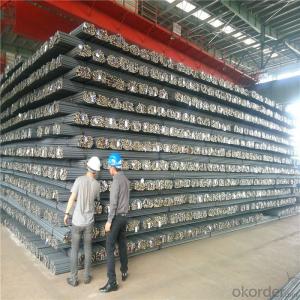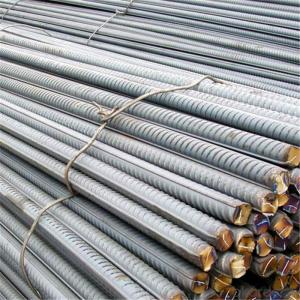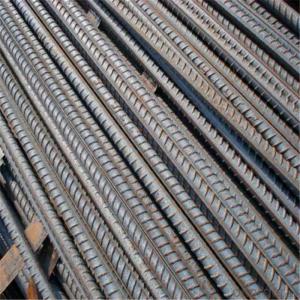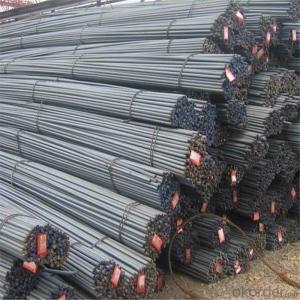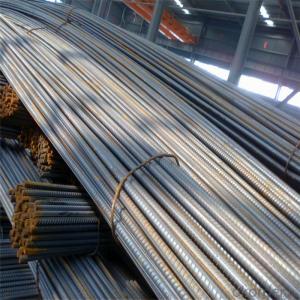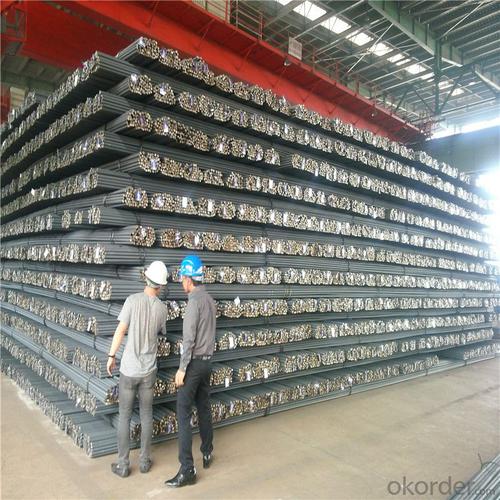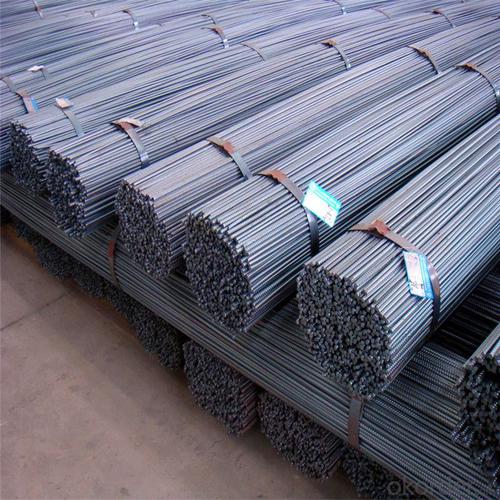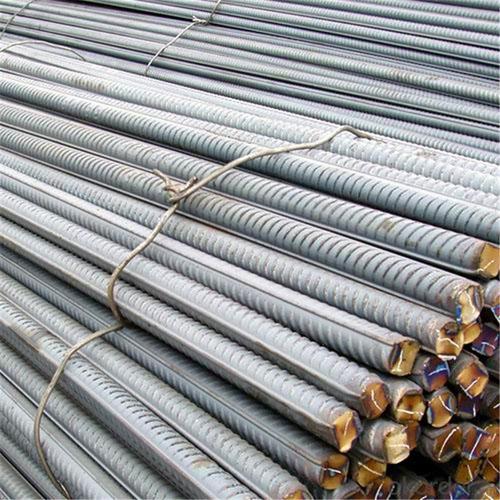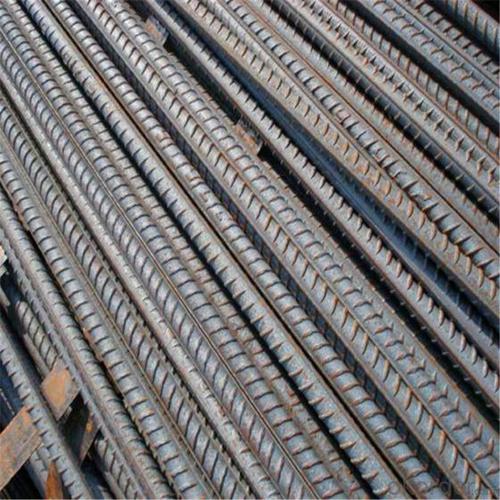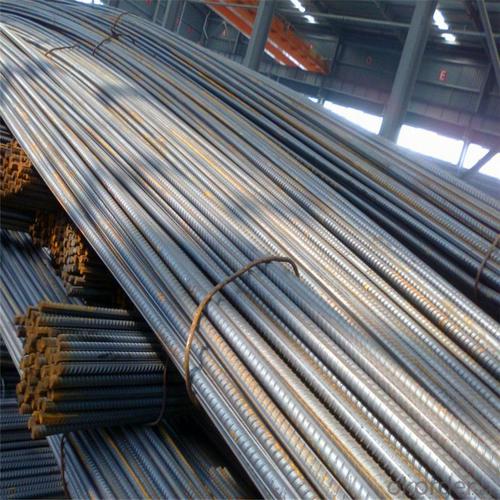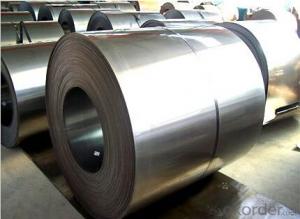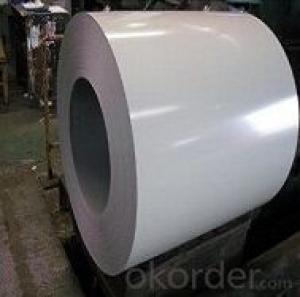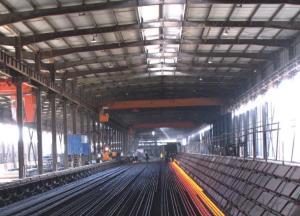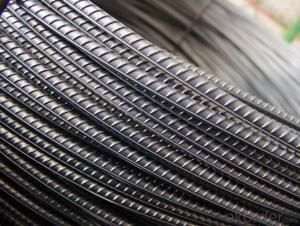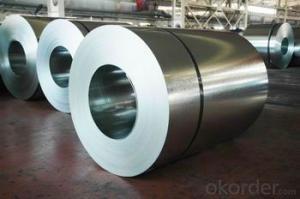Galvanized Deformed Bars in Coils 6mm to 12mm
- Loading Port:
- Tianjin
- Payment Terms:
- TT or LC
- Min Order Qty:
- 100 m.t.
- Supply Capability:
- 500000 m.t./month
OKorder Service Pledge
OKorder Financial Service
You Might Also Like
Specification
Galvanized Deformed Bars in Coils 6mm to 12mm
Description of Galvanized Deformed Bars in Coils
1, Diameter: 5.5mm-10mm Galvanized Deformed Bars in Coils
10m- 40mm Galvanized Deformed Bars in Coils
2, Length: 6m, 9m, 12m or customized
3, Standard: GB, ASTM, AISI, SAE, DIN, JIS, EN
OEM technology - send detailed technical parameters for accurate quotation.
2, Produce Process: smelt iron - EAF smelt billet - ESR smelt billet -
hot rolled or forged to get the steel round bar and plate
3, Heat Treatment: annealing, normalizing, tempering, quenching
4, Surface Treatment: Black
5, Quality Assurance: We accept third party inspection for all orders.
You can ask testing organizations such as SGS, BV, etc. to test our products before shipping.
Chemical Composition of Galvanized Deformed Bars in Coils
Grade | Technical data of the original chemical composition(%) | |||||
Reinforcing steel bar HRB335 | C | Mn | Si | S | P | B |
≤0.25 | ≤1.60 | ≤0.80 | ≤0.045 | ≤0.045 | >0.0008 | |
Physics Capability | ||||||
Yield Strength(N/cm2) | Tensile Strength(N/cm2) | Elongation(%) | ||||
≥ 335 | ≥490 | ≥16 | ||||
Reinforcing steel bar HRB400 | C | Mn | Si | S | P | B |
≤0.25 | ≤0.16 | ≤0.80 | ≤0.045 | ≤0.045 | 0.04-0.12 | |
Physics Capability | ||||||
Yield Strength(N/cm2) | Tensile Strength(N/cm2) | Elongation(%) | ||||
≥ 400 | ≥ 570 | ≥ 14 | ||||
Products Show of Galvanized Deformed Bars in Coils
Company Information
CNBM International Corporation is the most important trading platform of CNBM group.
Whith its advantages, CNBM International are mainly concentrate on Cement, Glass, Iron and Steel, Ceramics industries and devotes herself for supplying high qulity series of refractories as well as technical consultancies and logistics solutions.


F A Q
1, Your advantages?
professional products inquiry, products knowledge train (for agents), smooth goods delivery, excellent customer solution proposale
2, Test & Certificate?
SGS test is available, customer inspection before shipping is welcome, third party inspection is no problem
3, Factory or Trading Company?
CNBM is a trading company but we have so many protocol factories and CNBM works as a trading department of these factories. Also CNBM is the holding company of many factories.
4, Payment Terms?
30% TT as deposit and 70% before delivery.
Irrevocable L/C at sight.
5, Trading Terms?
EXW, FOB, CIF, FFR, CNF
6, After-sale Service?
CNBM provides the services and support you need for every step of our cooperation. We're the business partner you can trust.
For any problem, please kindly contact us at any your convenient time.
We'll reply you in our first priority within 24 hours.
- Q: What are the main factors affecting the tensile strength of special steel?
- The main factors affecting the tensile strength of special steel include the composition of the alloy, the heat treatment processes used, the presence of impurities or defects, the grain size and structure, and the amount of cold work or strain hardening applied to the material. Additionally, factors such as the presence of residual stresses, the temperature at which the steel is tested, and the rate of loading can also influence the tensile strength of special steel.
- Q: Can special steel be used in marine environments?
- Yes, special steel can be used in marine environments. Special steel alloys, such as stainless steel or corrosion-resistant steel, are specifically designed to withstand the harsh conditions of saltwater and other corrosive elements found in marine environments. These alloys have excellent resistance to corrosion, erosion, and pitting, making them suitable for various marine applications, including shipbuilding, offshore structures, and marine equipment.
- Q: What are the advantages of using special steel in industrial applications?
- Using special steel in industrial applications has several advantages. Firstly, it offers exceptional strength and durability, making it suitable for heavy-duty tasks. The unique composition and manufacturing process of special steel result in a material that can withstand high levels of stress, extreme temperatures, and harsh environmental conditions. This makes it ideal for industries such as construction, automotive, and manufacturing, where reliable and long-lasting materials are required. Secondly, special steel exhibits excellent corrosion resistance. It can resist the damaging effects of moisture, chemicals, and other corrosive agents, which is crucial in industries like marine, oil and gas, and chemical processing. The corrosion resistance of special steel reduces the need for frequent maintenance and replacement, saving both time and costs for industrial applications. Furthermore, special steel offers superior machinability and formability. It can be easily shaped, cut, and welded to meet specific design requirements. This versatility allows for complex and intricate designs in various industrial applications, including machinery, tools, and equipment. Another advantage of special steel is its ability to maintain its properties at high temperatures. It has excellent heat resistance, ensuring that it remains strong and stable even under extreme heat conditions. This makes special steel suitable for applications involving high-temperature environments, such as aerospace, power generation, and furnace components. Additionally, special steel can exhibit excellent wear resistance and hardness. It can withstand abrasion, friction, and impact, making it ideal for applications where materials are subjected to heavy wear and tear, such as mining, construction equipment, and cutting tools. The wear resistance of special steel ensures that components have a longer lifespan and require less frequent replacement. In conclusion, the use of special steel in industrial applications brings forth exceptional strength and durability, corrosion resistance, machinability and formability, heat resistance, and wear resistance. These properties make special steel a preferred choice for a wide range of industries, contributing to improved performance, longevity, and cost-effectiveness.
- Q: How is special steel used in the power generation industry?
- Special steel is widely used in the power generation industry for various applications. It is utilized in the manufacturing of turbines, boilers, and other critical components due to its exceptional strength, heat resistance, and corrosion resistance properties. Special steel is crucial in ensuring the efficiency and reliability of power plants, enabling them to withstand high temperatures and pressures, while also minimizing downtime and maintenance costs.
- Q: How does special steel perform in cryogenic applications?
- Special steel is known for its excellent performance in cryogenic applications. Cryogenic temperatures refer to extremely low temperatures below -150 degrees Celsius (-238 degrees Fahrenheit). In such conditions, regular steel tends to become brittle and lose its strength, making it unsuitable for use. However, special steel, also known as cryogenic steel or low-temperature steel, is specifically designed to withstand these extreme cold temperatures. One of the key properties of special steel is its ability to maintain its mechanical properties even at cryogenic temperatures. It retains its strength, toughness, and ductility, ensuring that it can withstand the stresses and strains imposed on it in cryogenic environments. This allows special steel to be used in various applications, such as cryogenic storage tanks, pipelines, and equipment in industries like aerospace, energy, and healthcare. Special steel also exhibits excellent resistance to brittle fracture at low temperatures. This is crucial, as brittle fractures can occur when materials become too brittle and fail under stress. The unique composition and processing of special steel help prevent this, ensuring the integrity and safety of components in cryogenic systems. Moreover, special steel has a low coefficient of thermal expansion, meaning it experiences minimal dimensional changes when exposed to temperature variations. This property is highly advantageous in cryogenic applications, as it helps maintain the stability and reliability of equipment and structures. In addition, special steel offers good corrosion resistance, which is essential in cryogenic environments where the presence of moisture and certain chemicals can accelerate corrosion processes. The resistance to corrosion ensures the longevity and durability of components, reducing maintenance and replacement costs. Overall, special steel is a preferred choice for cryogenic applications due to its ability to maintain mechanical properties, resistance to brittle fracture, low thermal expansion, and corrosion resistance. These properties make it a reliable and efficient material for use in cryogenic systems, providing the necessary strength and durability even in extremely low-temperature conditions.
- Q: What are the main applications of special steel in the defense vehicles?
- Special steel is used in defense vehicles for various critical applications. It is particularly important in the manufacturing of armor plates, which provide protection to military vehicles against ballistic threats. Special steel is also used in the production of components like suspension systems, axles, and chassis, ensuring durability and strength in harsh conditions. Additionally, it is utilized in the construction of weapon systems, such as missile launchers and gun barrels, due to its high tensile strength and resistance to extreme temperatures. Overall, special steel plays a crucial role in enhancing the performance and survivability of defense vehicles.
- Q: How does special steel contribute to the dimensional stability of products?
- Special steel contributes to the dimensional stability of products through its unique properties and characteristics. One of the key factors is its high level of hardness, which allows it to resist deformation or changes in shape and size under varying temperature and load conditions. This hardness ensures that the product maintains its intended dimensions and shape, even when subjected to external forces or thermal fluctuations. Moreover, special steel often possesses excellent thermal conductivity, enabling it to efficiently distribute and dissipate heat. This property helps prevent localized heating or cooling, which can cause dimensional changes in materials. By maintaining consistent temperatures across the product, special steel minimizes the risk of warping, expansion, or contraction, thereby ensuring dimensional stability. Another aspect that contributes to dimensional stability is the low coefficient of thermal expansion of special steel. This coefficient measures the amount of expansion or contraction a material undergoes in response to temperature changes. Special steel's low coefficient means it experiences minimal dimensional changes when exposed to temperature variations. This characteristic is particularly crucial in applications where precise tolerances and tight dimensional control are required, such as in aerospace or automotive industries. Furthermore, special steel often possesses enhanced corrosion resistance, which helps prevent rusting or degradation of the material over time. Corrosion can lead to changes in the shape and dimensions of products, compromising their dimensional stability. By using special steel, manufacturers can ensure that their products maintain their original dimensions and structural integrity, even in harsh or corrosive environments. Overall, the unique properties of special steel, such as high hardness, excellent thermal conductivity, low coefficient of thermal expansion, and corrosion resistance, all contribute to the dimensional stability of products. By incorporating special steel into the manufacturing process, companies can produce high-quality products that maintain their precise dimensions and shape, ensuring reliability and longevity for end-users.
- Q: How does special steel contribute to improving product efficiency in energy-intensive processes?
- Special steel contributes to improving product efficiency in energy-intensive processes by providing enhanced strength, durability, and resistance to corrosion and wear. These properties allow for the development of more efficient machinery and equipment, reducing energy losses due to friction and wear. Additionally, special steel's high heat resistance enables the production of components that can withstand extreme temperatures, improving overall energy efficiency in processes such as high-temperature heat treatment or combustion. Moreover, its superior mechanical properties enable the construction of lighter and more compact designs, leading to reduced energy consumption during transportation and operation. Overall, special steel plays a vital role in optimizing energy-intensive processes by enhancing performance, longevity, and energy efficiency of products and equipment.
- Q: What are the different testing methods for special steel?
- There are various testing methods for special steel, including hardness testing, tensile testing, impact testing, metallographic testing, and non-destructive testing. Each method helps assess different properties of the steel, such as strength, toughness, microstructure, and defects, ensuring its quality and suitability for specific applications.
- Q: What are the main characteristics of pressure vessel steel forgings?
- The main characteristics of pressure vessel steel forgings include high strength, excellent durability, enhanced resistance to corrosion and wear, and the ability to withstand high pressure and temperature conditions. These forgings are typically made from low-alloy or carbon steel and undergo a forging process to improve their mechanical properties and ensure uniformity. Additionally, pressure vessel steel forgings are extensively tested for quality assurance to ensure their reliability and safety in various industrial applications.
Send your message to us
Galvanized Deformed Bars in Coils 6mm to 12mm
- Loading Port:
- Tianjin
- Payment Terms:
- TT or LC
- Min Order Qty:
- 100 m.t.
- Supply Capability:
- 500000 m.t./month
OKorder Service Pledge
OKorder Financial Service
Similar products
Hot products
Hot Searches
Related keywords
